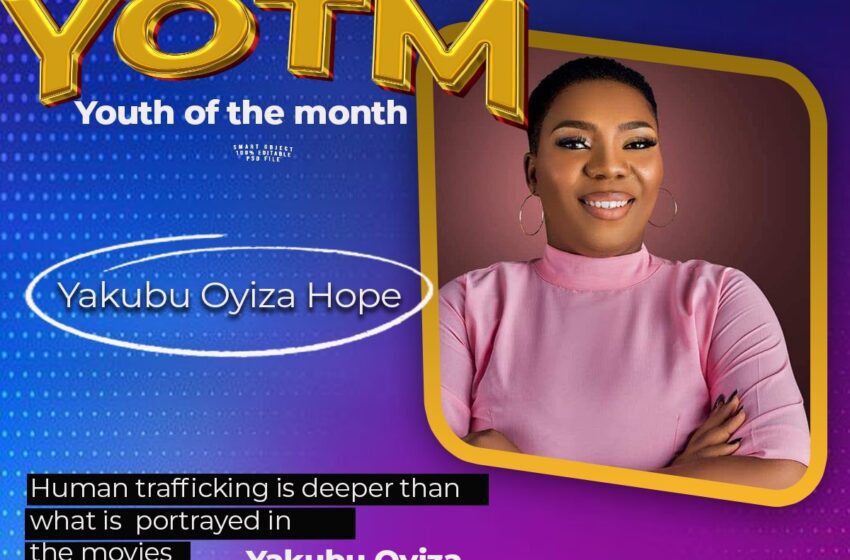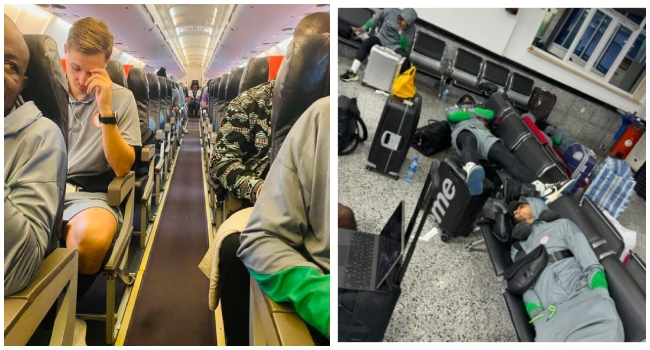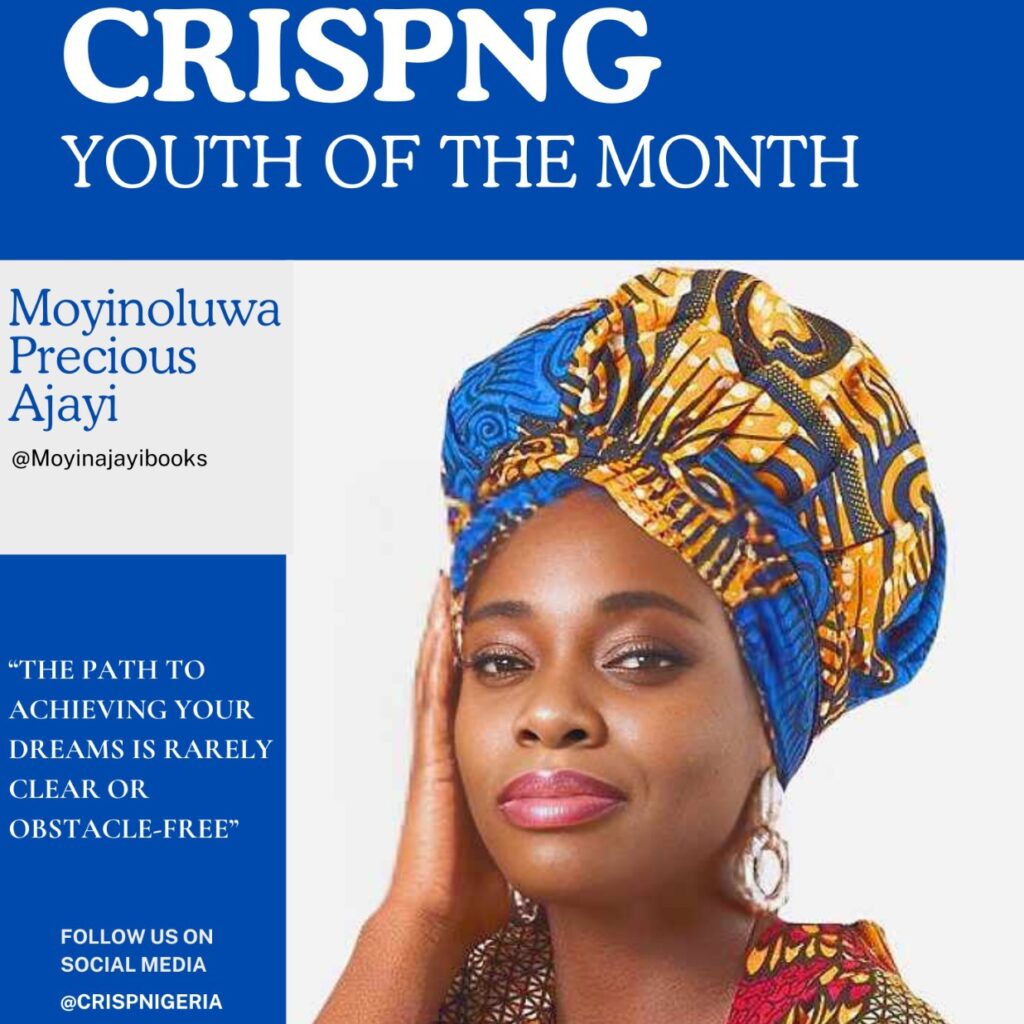CrispNG Youth of the Month: Meet Yakubu Oyiza Hope, the Nigerian leading fight against human trafficking

A young lady, passionate about obtaining a good education, gets caught in the dark web of human trafficking as she seeks to raise money to further her studies.
The tempting promise of a job paying over five times her salary, including food and accommodation, led her to bid farewell to Nigeria and embark on a traumatic journey to Libya.
This journey saw her hiding in trees from Tuaregs, facing sexual abuse, enduring illegal detention, and experiencing kidnapping. Miraculously, she found redemption, reunited with her family, is healing from her trauma, and now shares her story while helping other human trafficking victims through her foundation.
CrispNG’s Youth of the Month for July, is a human trafficking survivor who is leading the fight against human trafficking.

Can we meet you?
My name is Yakubu Oyiza Hope (Luna). I’m based in Akwa Ibom, but I’m from Kogi State. I am the founder of Luna Hope Foundation, an anti-human trafficking organization focused on raising awareness about human trafficking, sex trafficking, exploitation, and illegal migration.
Can you share your story with us?
I am one of the survivors of human trafficking in Libya. I left for Libya in 2015 and was there for 30 months, which is 2.5 years. My story is one of exploitation, ignorance, and survival. I left Nigeria at the end of March 2015 and arrived in Libya on May 5th.
The traumatic journey to Libya
The whole experience was and is still traumatic. We spent over a month to get to our location, traveling in a Hilux (Tundra, open back), packed without coverage. Although no one died in our Hilux, we saw corpses on the road and dried bones. We saw places marked with stones. At one point, we had to hide from the police in Brak. If found, we faced detention, being sold, or returned to Nigeria. We didn’t travel a legal route due to the lack of documents.
On a direct route from Nigeria to Libya, it shouldn’t take a week, but we had to go through the desert and forest, hiding from police and rebels, which made the journey longer. We made provisions for food (snacks, beverages) and carried 6-7 kegs of 25 liters of water. There were 21 of us on the journey, working together to make sure that we arrive safely in the end. Summarily, the desert trip was hell, and when we arrived in Libya, we discovered it wasn’t as rosy as portrayed.
A roseless bed of thorns
I got a job upon arrival, as agents arrange employment for newcomers. When someone brings you in, they notify the agent of your arrival and request a job placement, so securing work isn’t too difficult. However, the Arabs tend to exploit you, knowing you lack documents or organisational protection.
The first house I worked in was decent in terms of relationships; they didn’t stress me out personally. However, the house was enormous, a four-storey building, and the job was beyond my capacity. I would wake up at 6 or 7 a.m. and usually go to bed at 12 or 1 a.m. Additionally, the chemicals used there were harsh on my skin, causing it to peel. I complained about the workload, and the agent found me another house.
In the new place, I started facing sexual harassment from the only son of the family. He would sneak into the kitchen or bathroom and harass me, which I couldn’t tolerate. I informed the family that I wanted to leave to avoid being sexually assaulted, as there would be no one to help me, not even the police. They tried to make me stay, but I had already made up my mind. My decision upset them, and when it was time for me to leave, they drove me to the police station instead of my place. I was framed for stealing and spent about three months in prison before being released. My experience in prison was a terrible ordeal which I’ve not recovered from.
READ ALSO
Youth of the Month: Aliyu Kure, the Nigerian bridging digital divide in rural communities
Organ trafficking: UK jails Nigerian senator Ekweremadu — here’s what to know about him
Economic hardship: UNN students recount survival strategies on campus
After my release, I started working elsewhere. One day, I was lured by kidnappers under the pretext of bringing money to secure my friends’ release. Upon arriving, I was kidnapped as well and almost sold. Miraculously, it rained that day, and while the Arabs who kidnapped me were jubilating, I ran over the fence through the bush until I reached the main road. That was how I made my escape.
In terms of trafficking underaged children, is there usually an agreement between the parents of the children and traffickers, or is it based on ignorance?

Traffickers often use the push and pull factor. They look at what is lacking in Nigeria, such as high rates of poverty, inflation, and unemployment. They convince parents to release their unemployed children with the promise of a job in Libya or elsewhere. Parents struggling to cater for several children might give in and release the eldest child. If the child is underage, the age is falsified. Traffickers prey on the ignorance of parents with promises of a better life for their children.
In your case, what made you go to Libya?
In 2015, I was working and earning 15,000 naira and wanted to go back to school. An agent approached me and told me I could make up to 80,000 naira in Libya per month, including feeding and accommodation. Earning 15,000 naira and paying my rent from it made the Libya offer enticing. So, I went with the intent of raising enough money to fund my school bills.
Can you compare life in Libya and Nigeria?
Libya is a failed state that cannot protect its citizens, let alone foreigners, especially illegal ones. There is no regard for human rights, and safety is a constant concern. Despite Libya’s stronger currency and higher pay, the lack of laws and protection makes it a dangerous place. In Nigeria, at least you can report issues to the police or use social media to get for help, there the media is also controlled. Also, the cost of living in Libya is high and what you earn amounts to almost nothing as you can barely save after making expenses.
Tell us more about your foundation.

Luna Hope Foundation focuses on raising awareness about illegal migration because one of the causes of human trafficking in border countries is illegal migration. When people leave Nigeria for other countries without their passport, work permit, or resident permit, the government cannot protect them.
We raise awareness about illegal migration and try to discourage people from going to Libya, Mali, and Burkina Faso, especially without the right documents. We also intervene for human trafficking victims. We collaborate with other agencies to help people trapped, sold into sex slavery, used for drug trafficking, or forced labor, and see how they can be repatriated back to their home countries.
Is there a way of tracking traffickers and helping survivors get justice?
Most human trafficking survivors do not get justice due to the lack of evidence and witnesses. We focus on preventing future victims by raising awareness and intervening when we have proof. However, 99% of victims do not get justice as they cannot prove their claims. They can’t call out traffickers or make reports without evidence, because courts deal with facts, not emotions.
What are the success stories your foundation has recorded?
One success story is the raid of Ochofana, where we helped free about 10,000 girls trafficked for sex. We recovered 57 sex tapes in Burkina Faso used for blackmail and freed many victims. We’ve also helped about 500 migrants across Mali, Ivory Coast, Burkina Faso, Senegal, and Libya.
What are the challenges Luna Foundation faces?
Finance and manpower are major challenges. We have experienced and educated people on board, but without the right resources, we can’t implement all our projects.
What’s the success rate of people moving to and settling in Libya?
I don’t have exact statistics, but the success rate is low compared to the number of migrants. Most are on sponsorship visas and work for their sponsors for 1.5 years. After paying off sponsors, they face high living costs and exploitation. Only those involved in trafficking (burgers) make significant money by exploiting others.
Did your family know about experience while you were in Libya?
I communicated with them when I could, but never told them everything, especially my mother. Some families are emotional and would worry too much. I withheld certain information to protect them.
Would you call your return to Nigeria a miracle?

Yes, it was a miracle backed by God and my determination. I was determined to come back home and not lose my life in a strange land.
How did you recover from your experiences?
My recovery is self-managed, although I would not say that I fully recovered from the trauma. I returned in 2017 when advocacy wasn’t strong, so I had to do it on my own.
Do you think the movie Oloture does justice to the issue of human trafficking?
I’ve been campaigning against human trafficking for over two years and still haven’t been able to fully portray its horrors. “Oloture” depicts some aspects, but human trafficking is broader. Different people experience various forms of trafficking, often worse than what’s shown.
What’s your advice to young people and others desperate to leave the country?
If you want to travel, do it right. There’s no shortcut to success. Avoid becoming a victim of traffickers. Seek proper information and use legal means.
Even in a free town, nothing is free. Beware of sponsorship visas that seem too good to be true; you might end up paying with your life.
EDITOR’S NOTE: CrispNG’s Youth of the Month is an initiative to celebrate Nigerians bracing the odds and contributing positively to society. The recognition, which holds monthly, spotlights vibrant Nigerians who have either used their resources or skills to create value, while also inspiring others in the process.




